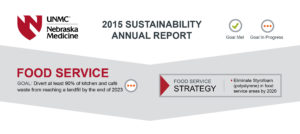Food Services
Over the past decade, the movement to create healthier, more sustainable food systems and to reduce food waste on hospital campuses has intensified. On average, more than 20 percent of a large hospital’s total waste is food waste, despite the fact that almost everything coming out of the kitchen and dining areas could be recycled or fed into a biological process (e.g., composting, anaerobic digestion, food for farm animals).20 While there are numerous ways that food service operations can be more sustainable, many of the short-term strategies that are listed primarily focus on eliminating waste. The goal is for UNMC/NM’s food service operations to become zero-waste, which the Zero Waste International Alliance defines as achieving at least 90 percent diversion of all waste from the landfill or incinerator.21 There are also short- and long-term strategies that focus on increasing the amount of sustainably-produced food offerings and promoting healthier lifestyles through good food choices. By working with its long-term food services vendor, Sodexo, which has demonstrated a good foundation and willingness for adopting sustainable food service operations, UNMC/NM have the opportunity to further reduce the waste that they produce as well promote healthy food choices in alignment with their community health-oriented missions.
BaselineThere is no specific metric or baseline |
GoalFood Services Waste |




